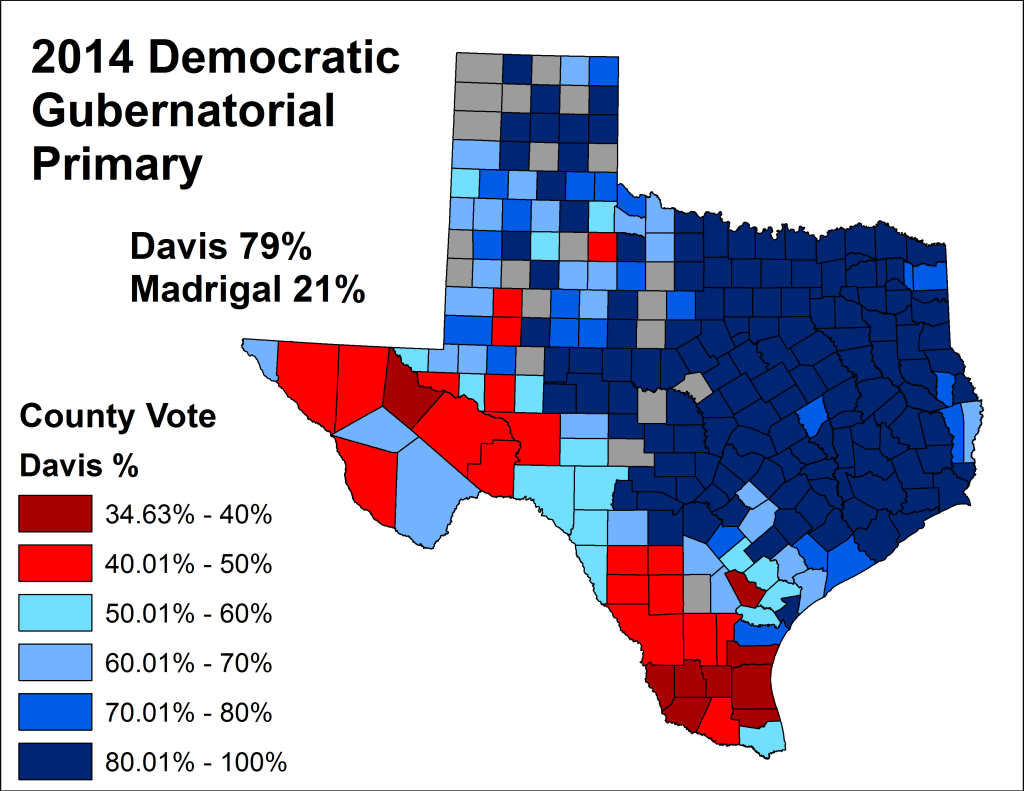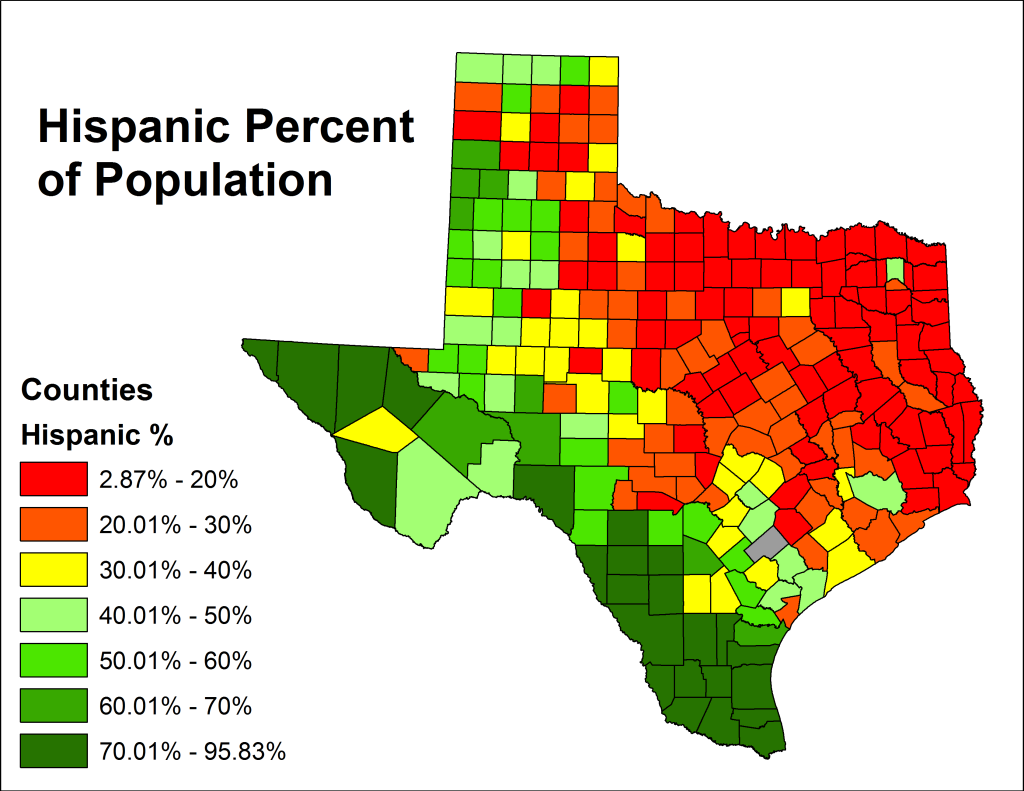A great deal of the focus on Tuesday night’s Texas Primaries were on the Republican side of the ballot. Democrats had a few primaries to watch, but Republican fights for Lt Governor and a handful of congressional seats were the focus of most election watchers like myself. In fact the big story from Tuesday was Lt Governor Dewhurst coming in second in his primary for re-election, in addition to Congressman Hall’s need for a primary runoff to hold his seat. However, articles are appearing all over local and national press about the Democratic Primary for Governor in the state of Texas.
Most casual observers may not have known that Democrat Wendy Davis, the star candidate out of Texas, famous for her filibuster to a state senate bill to dramatically restrict abortion rights (including a 20 week abortion ban and massive regulation aimed to close clinics), had a primary to secure the nomination for the Democrats. Davis faced an unknown opponent, Rynaldo Madrigal, who raised no money, and won the nomination with 79% of the vote. Republican Attorney General Greg Abbot won his primary with 91%. Davis’ defeat of Madrigal was no surprise. However, what is being pointed out by the Press and the Republican Party of Texas is that Davis lost several Hispanic counties in southern Texas.

The southern border of Texas is a heavily Hispanic region of the state and a major source of Democratic votes.

Democrats routinely lose Texas by 10% or more, even when pushing strong candidates. Both the 2010 and 2006 Governor races saw Democrats put up a fight for the state but come up short. In all three races the Democrats relied on the southern region of the state for wins.
This region is giving its votes to an unknown candidate against Wendy Davis, who has very high recognition and has already been spending money in the state.
The Republicans are quick to pounce on this news (this Politico article has both sides), claiming it shows Davis is weak with Hispanics, most of whom are Catholic in south Texas, because of her stance on abortion. Democrats contend that it was the Hispanic surname of Davis’ opponent that allowed him to win those counties. Local Democratic leaders in the area have argued both things may be true; that Davis is weakened with Hispanics because of abortion, and that Madrigal’s name got him votes in the south.
I was inclined to think that the name had more to do with the votes in south Texas. However, I couldn’t help but wonder how a complete unknown could beat the rising star of Texas Democrats. Davis isn’t some generic Democratic candidate, she is a major player in the state. Perhaps the abortion issue was real and not just a GOP talking point. Looking to polling, I believe I found an answer.
So first let me state something for those who don’t follow Texas politics.. The Hispanics of Texas are not as Democratic as Hispanics nationwide. Republicans normally get 35% or more of the vote and can crack the high 30s or low 40s. Hispanics in Texas are predominately Catholic and thus more conservative on social issues. Meanwhile, Republicans in Texas don’t appear to have killed their image with Hispanics like the California Republicans did back in the 1990s. Davis’ pathway to victory isn’t just winning the Hispanic vote, she needs to crush Abbot with Hispanics. White voters will only go so far in Texas and are firmly entrenched in the Republican camp. Davis’ path to victory relies on a mixture of high Hispanic turnout and high Hispanic margins. Polling, however, shows that Davis is not getting the numbers she needs with Hispanics.
Polling has been minimal in Texas, so I am going to rely on two polls from Public Policy Polling. The firm polled the race in June 2013, shortly after Davis made national waves for her filibuster. The June numbers were hypothetical, as Davis had not declared her plans to run.
- In June, Davis lost to Abbott 48-40. She had 40% approval and 14% disapproval with Hispanics. She got 47% of Hispanics to Abbott’s 31%. The abortion law was little known with Hispanics, 12% supported the law while 25% were against it.
Then, as the months went on, Davis announced she would run for governor and the campaign began. In October, pro-life groups began running Spanish-language ads attacking Davis on abortion. The ads focused entirely on the 20 week abortion ban. Public Policy Polling did a follow up poll a month later.
- In November, Davis lost to Abbott 50-35. Her approval with Hispanics remained 40%, but her disapproval grew to 35%. Abbott was then taking 43% of the Hispanic vote to Davis’ 38%. Hispanics remained divided on the abortion law, but most knew about it; 40% favored the law, 43% were against.
Those shifts show a very problematic trend for Davis. Hispanics lean toward Abbott, who has been campaigning for the Hispanic vote. Abbott is hoping to get more than Rick Perry’s 38% from 2010. Abbott has toned down his rhetoric (he is very conservative) and his wife, who is of Hispanic decent, has been prominently featured. Abbott’s polling position with Hispanics, if unchanged, would ensure his victory. Republican candidates who have won in the past did worse with Hispanics than Abbott is now.
In fact, here is the 2008 Presidential Election in Texas, the 2010 Gubernatorial election Texas, and current 2014 polling. McCain in 2008 won Texas with 11 points and Perry in 2010 won by 12. Neither did as well with Hispanics as Abbott is in polling.
Now, Davis could still win the Hispanic vote, and the November poll is some time back (PPP has not released another one). However, these polling numbers conform with Davis’ problems in south Texas on primary night. It is just unlikely that the name of her opponent would be enough to cause such deviation from the rest of the statewide vote.
What also appears clear is that the abortion bill Davis filibustered is not a winning issue with Hispanics. At best Hispanics are divided on the issue, and the trend-lines show a dramatic increase in support for restrictions. This is no doubt thanks to Republicans framing the bill as more about the 20-week ban (a popular position nationwide) than on the sneaky regulations that aimed to close clinics.
Now, the abortion restriction question was worded different between June and November (with June referencing the bill itself), which could explain why so many voters were undecided on the issue. However, Hispanic voters in the June poll were asked if the supported Davis’ filibusterer, and 85% registered an opinion. Hispanic voters supported Davis’ filibusterer by a 46-35 margin. The 35% against, however, shows the social conservative influence of Texas Hispanics.
Now, Davis’ campaign as certainly not been running on the abortion issue. In fact, Davis garnered press when she said she could support a 20-week ban on abortions as a stand alone bill. Davis’ campaign has been focused on education, immigration, wages, and other issues important to Catholic Hispanics. However, it does appear the attacks from October and onward have had an effect. Without more polling it is hard to confirm anything regarding Texas Hispanics, Wendy Davis, and abortion. More polling, with cross-tabs, is needed.
What I do know for sure is this. Davis has a very tight window for victory in Texas. If the Hispanic numbers do not turn around in a major way, then sadly, the slim chances Democrats have in Texas in 2014 will completely evaporate.
